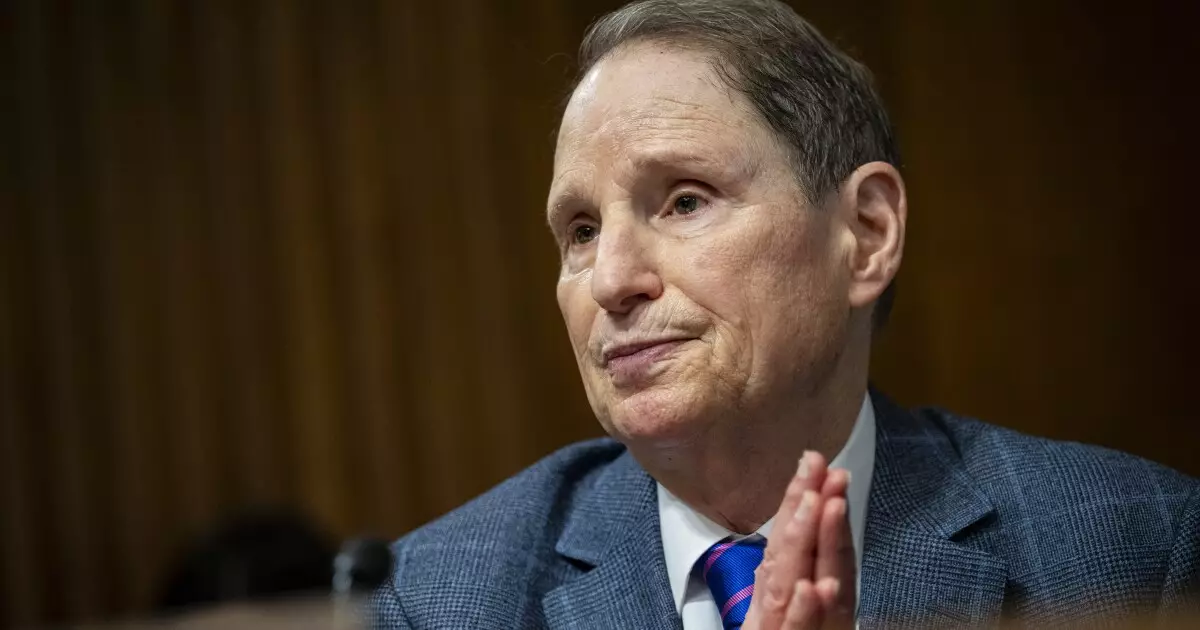As the prospect of tax reforms looms ahead, the Senate Finance Committee’s recent hearing has set the stage for a divisive debate between Democrats and Republicans. Central to this discussion is the expiration of key provisions from the 2017 Tax Cuts and Jobs Act (TCJA) and divergent views on how to address tax policy moving forward. With the stakes high for the American middle class and the federal budget, lawmakers are primed to engage in a complex dance of negotiating interests, obligations, and fiscal responsibilities.
At the forefront of the discussions is Senator Ron Wyden from Oregon, who has asserted that the impending tax debate represents a critical juncture for America’s future. Wyden emphasized the necessity of addressing whether wealthy individuals will finally pay taxes on their actual income, a sentiment that echoes concerns over income inequality and the challenges of tax avoidance. Demanding a more equitable tax system, he highlights the contrasting economic realities faced by different societal classes and the urgent need to scrutinize loopholes that disproportionately benefit high earners.
On the opposing side, Senator Mike Crapo from Idaho pointed out the potential consequences of allowing TCJA provisions to sunset. Portraying it as an impending crisis, he warned of “multi-trillion-dollar tax hikes” that could have dire repercussions on American households. The framing of tax policy as a football game is apt; each party is strategizing to protect their constituencies while pushing against the rival’s objectives.
Trump’s Legacy and Future Implications
The TCJA, a cornerstone of former President Donald Trump’s fiscal agenda, is central to the upcoming discussions. As its provisions are set to expire, there remains gigantic pressure on both parties to advocate for either its extension or repeal. Trump has consistently made the case for making these provisions permanent, viewing it as pivotal to his campaign and legacy. Conversely, Vice President Kamala Harris supports letting these tax breaks fade away, representing a broader Democratic strategy to rethink the entire tax structure.
Across the aisle, unease is palpable among municipal market participants, who fear that the tax exemptions, especially involving municipal bonds, may come under threat during reform discussions. The cost of extending the TCJA poses a significant challenge, with lawmakers likely searching for coping mechanisms to mitigate a substantial financial burden.
State and Local Tax Concerns
Among the various tax concerns raised during the hearing, the discussion surrounding the $10,000 cap on state and local tax (SALT) deductions was prominent. This contentious cap has created substantial financial distress for taxpayers in high-tax states, which are typically governed by Democratic representation. Newly appointed New Jersey Senator George Helmy highlighted the impact of the SALT cap on taxpayers, indicating that many in his state effectively lost out on significant deductions post-TCJA. He stressed that these deductions play a crucial role in funding vital services like education and public infrastructure, thus broadening the perspective on tax policy from merely a revenue-generation tool to an avenue for social responsibility.
The debate over SALT deductions underscores a significant element of America’s tax structure: its perceived fairness. While critics argue it primarily benefits affluent homeowners, Helmy counters that lower- and middle-income families are disproportionately impacted. Such viewpoints will likely feature prominently as lawmakers seek common ground.
Future Housing Policies and Democratic Priorities
Beyond just the question of tax breaks, the hearing delved into broader economic strategies, including initiatives for affordable housing. The need for improved workforce housing solutions, particularly in high-cost areas, remains crucial in Democratic circles. Policymakers are seeking tax package reforms that can address issues of supply and demand in the housing market, reflecting a recognition of the intertwined nature of tax policy and economic well-being.
As noted by Senator Maggie Hassan of New Hampshire, streamlining and revitalizing programs like the low-income housing tax credit could be essential for stabilizing housing costs and assisting with rental assistance efforts. This indicates a forward-thinking approach that looks not just at immediate financial implications, but also the long-term socioeconomic outcomes for American families.
The idea of implementing a minimum tax on billionaires has surfaced as an intense point of discussion, reminiscent of broader challenges regarding wealth inequality. The Biden administration has floated this controversial proposal, with proponents like Senator Elizabeth Warren asserting that it could yield significant revenue while rectifying systemic inequities in the tax code. However, dissenters like Senator Steve Daines express concern that such measures mirror extreme taxation policies that threaten economic freedoms.
As Congress gears up for what many are hailing as a historic tax reform battle, it is clear that the competing ideologies of taxation will be front and center. With powerful lobbying around both sides of the debate, the outcomes will shape not only the economic landscape but also the political fabric of the nation as the 2024 elections draw nearer. Whether the forthcoming negotiations will yield genuine reform or deepen political divides remains to be seen, but the stakes could not be higher.


Leave a Reply